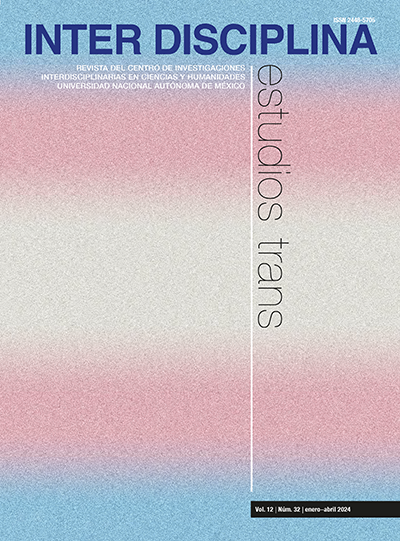Trans* tales: [re]-twisting narrative contracts in documentary film
Main Article Content
Abstract
"Trans* tales: [re]-twisting narrative contracts in documentary film" offers a critical and creative perspective on narrative constructions around trans and gender dissidence. This essay is a search and a dialogue with several narrative and narratological proposals in order to trace possible alternative routes for the construction of trans stories. Drawing on the work of a wide range of feminist, trans, and cultural studies thinkers, academics, and narrators.
Downloads
Article Details
Citas en Dimensions Service
References
Berger, John. 1991. And our faces, my heart, brief as photos. Nueva York: Vintage Books.
Camacho, Jeison. H. 2020. Devenir cuir, devenir monstruo: una cartografía del deseo. Cambios y Permanencias, 11(2). Universidad Industrial de Santander.
Campbell, Joseph. 2008. The hero with a thousand faces. 2a ed. Novato, CA: New World Library.
Canguilhem, Georges. 1986. Monstrosity and the monstrous. Diacritics, 16(2): 4-16.
Cortés, Andrés. 2017. El legado de Hija de Perra: El travesti y activista que cambió los paradigmas a través de lo extraño. UPSOCL. https://www.upsocl.com/cultura-y-entretencion/el-legado-de-hija-de-perra-el-travesti-y-activista-que-cambio-los-paradigmas-a-traves-de-lo-extrano/
Crenshaw, Kimberle. 1989. Demarginalizing the intersection of race and sex: a black feminist critique of antidiscrimination doctrine, feminist theory and antiracist politics. The University of Chicago Legal Forum, 1(art. 8): 139-167. http://chicagounbound.uchicago.edu/uclf/vol1989/iss1/8.
Foucault, Michel. 1975. Vigilar y castigar: nacimiento de la prisión. Buenos Aires: Siglo XXI.
Gosset, R., Stanley, E. y Burton, J. (eds.). 2017. Trap door. Trans cultural production of visibility. Cambridge, Massachusetts: MIT Press.
Guerrero Mc Manus, Siobhan y Muñoz Contreras, Leah. 2018. Ontopolíticas del cuerpo trans: controversia, historia e identidad. En Raphael de la Madrid, Lucía y Antonio Gómez Cíntora (coords.), Diálogos diversos para más mundos posibles. Ciudad de México: Universidad Nacional Autónoma de México, Instituto de Investigaciones Jurídicas, 71-94.
Guerrero, M. A. y Muñoz, E. 2018. Sexualidades diversas: una introducción a las teorías, estudios y movimientos LGBTI+. México: FCE (Estudios y movimientos LGBTI+).
Gumucio, Alfonso. 2014. Cine comunitario en América Latina y el Caribe. Bogotá: FES (Fundación Friedrich Ebert).
Halberstam, Jack. 2011. The queer art of failure. Durham: Duke University Press.
Halberstam, Jack. 2013. El arte queer del fracaso. Barcelona/Madrid. Egales.
Haraway, Donna. 1988. Situated knowledges: the science question in feminism and the privilege of partial perspective. Feminist Studies, 14(3): 575-99.
Haraway, Donna. 2022. Seguir con el problema. Generar parentesco con el Chthuluceno. Bilbao: Consomni.
hooks, bell. 2004. La voluntad de cambiar: hombres, masculinidades y amor. Nueva York: Atria Books.
Ira T. 2022. Los monstruos de Preciado. CTXT. Contexto y Acción, abril 25. https://ctxt.es/es/20220401/Firmas/39456/Ira-T-Paul-B-Preciado-alteridad-queer-trans-monstruos-Frankestein.htm.
K. Le Guin, Ursula. 1986. The carrier bag theory of fiction. Londres: Ignota Books.
K. Le Guin, Ursula. 1989a. Dancing at the edge of the world. EUA: Grove Press.
K. Le Guin, Ursula. 1989b. La teoría de la bolsa transportadora de la ficción. En K. Le Guin, Ursula, Dancing at the edge of the world. EUA: Grove Press.
Missé, Miquel. 2018. A la conquista del cuerpo equivocado. Barcelona: Editorial Egales.
Moraña, M. 2017. El monstruo como máquina de guerra. España: Iberoamericana-Vervuert.
Pierce, Joseph M. 2020. I monster: embodying trans and travesti resistance in Latin America. Latin American Research Review, 55(2): 305-321.
Shock, Susy. 2011. Poemario trans pirado. Buenos Aires: Nuevos Tiempos.
Rancière, Jacques. 2010. El espectador emancipado. Buenos Aires: Manantial.
Rodríguez, Claudia. 2013-2014. Cuerpos para odiar: Sobre nuestras muertes, las travestis, no sabemos escribir. Chile.
Sabsay, Leticia. 2014. Políticas queer, ciudadanías sexuales y decolonización. En Falconí Trávez, D., Castellanos, S. y Amelia Viteri, M. (eds.), Resentir lo queer en América Latina: diálogos desde/con el Sur. Barcelona-Madrid: Egalés, 45-58.
Straube, Wibke. 2014. Trans cinema and its exit scapes: a transfeminist reading of utopian sensibility and gender dissidence in contemporary film. Linköping, Linköping Studies in Arts and Science, 628.
Torrano, Andrea. 2018. La monstruosidad en G. Canguilhem y M. Foucault. Una aproximación al monstruo biopolítico. Anales del Seminario de Historia de la Filosofía, 35(1): 171-188.
White, Michael. 1996. Narrative practice and exotic lives: Resurrecting diversity in everyday life. En Gene Combs y Jill Freedman (eds.), Narrative therapy with couples and families: a practitioner’s guide. Nueva York: The Guilford Press, 77-98.
White, Michael. 2002. Reescribir la vida. Barcelona: Gedisa.
White, Michael. 2002. El enfoque narrativo en la experiencia de los terapeutas. Barcelona: Gedisa.
White, Michael y David Epston. 1993. Medios narrativos para fines terapéuticos. Barcelona: Paidós.

Esta obra está bajo una Licencia Creative Commons Atribución-NoComercial-SinDerivar 4.0 Internacional.





